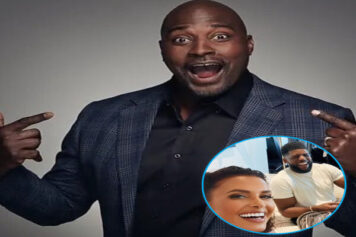Editors note: After the first week of Olympic action wrapped up, The Shadow League editors Vince Thomas and Khalid Salaam went back and forth on some of the topics (good hair, crip-walking, GOAT Olympian, Lolo hype, etc.) that had the American streets buzzing. This is Part II. Click here for Part I.
VINCE: A few days before the women started their heats for the 100M hurdles, Jere Longman wrote this in the New York Times:
“Jones has received far greater publicity than any other American track and field athlete competing in the London Games. This was based not on achievement but on her exotic beauty and on a sad and cynical marketing campaign. Essentially, Jones has decided she will be whatever anyone wants her to be — vixen, virgin, victim — to draw attention to herself and the many products she endorses.”
That’s exactly what I’ve been thinking for the past year, as I see Jones pop up on commercials and talk shows. And, now, after finishing fourth, she’s leaving another Olympics without a medal. She’s officially track’s version of Anna Kournikova.
KHALID: Lolo is certainly not the first person to have disproportionate fame, nor will she be the last. However, the comparisons to Anna Kournikova are straight as an arrow. Beauty will always get you farther than almost anything else (that’s of course, if you even consider Jones or Kournikova to be mind-blowing on the attractive scale…which I guess some do) and that will never change. Looks matter, let’s not pretend that they don’t. But, I'm not even really saying that this, as a social construct, is that big of a deal to me. I understand how this game is played. If you don't, you better learn. Pretty people get over until prettier people stop them.
VINCE: I can’t remember an Olympic athlete more hyped for less accomplishment. For instance, folks often cite the "Dan & Dave" Reebok campaign as an example of how the hype machine can backfire. Reebok beat us over the head with the commercials leading up to the 1992 Olympics. The two were supposed to “battle it out in Barcelona for the title of world’s greatest athlete,” except Dan O'Brien failed to even qualify and then Dave Johnson only won the bronze. But, to O'Brien's credit, he won the gold at the 1991 World Championships. Both dudes were world class winners (O'Brien went on to win the gold in at Atlanta at the 1996 Olympics) prior to that campaign. But Jones hasn't won crap. If there is even a semblance of adherence to some type of meritocracy, she's under a rock until she wins a medal at the next World Championships.
What about this greatest of all-time discussion the sports world is carrying on regarding Michael Phelps?
KHALID: Is Phelps the greatest Olympian ever? Like better than Jesse Owens or Sugar Ray Leonard or any of the hundreds before him? I say no, but that's because I don't consider swimming in a "greatness" context. Sure he has a bunch of medals and I'm not knocking him; I’m just saying that his name is not the first one I think of when the “greatest ever” discussion comes up.
VINCE: I have to be quite honest, until Phelps came along, I never watched the Olympic swim meets. Phelps put me on to swimming. I mention this because, although swimming has been a big draw these past two Olympics — and will probably be a big draw in Rio, based on the American women's profile — it's typically been been an afterthought for the five other Olympics I actively remember. Who was the big swim star before Phelps, a swimmer whose legacy endured? Mark Spitz, right? Spitz' big Olympic moment of winning seven gold medals came in 1972, at the Munich games. More than 30 years passed before another swimmer — or the sport really — returned to the American conscious. So, to your point of the "greatness context," that automatically puts Phelps at a disadvantage when comparing him to someone like Carl Lewis. Having said all that, though, homeboy has 22 medals, 18 of them gold. There's no getting around that. That resume is unimpeachable.
But, on some realness, if Usain Bolt wins the gold in the 200 – that's history. No one has ever won back-to-back gold's in the 100 and 200. And, at the time of his medals, he's setting world and Olympic records. The G.O.A.T. debate has focused on Phelps throughout the games, but, Bolt has a very legitimate case to tell Phelps to go kick some rocks.
KHALID: Well, Bolt doesn't have to tell Phelps to kick rocks – he'll have to tell the American media. Just on patriotism alone Phelps is gonna win that battle here in the U.S. and he will probably end up on a lot of people's short list for greatest ever. I just feel personally that swimming is a rich country's sport with a shallow (pun intended) bottom. It’s not like every country can invest in swimming facilities. Running is a more “open to everyone” sport. How about we call it a tie between those two and if Phelps enthusiasts wanna ride for him, well, they can aim for the second slot. Jesse Owens kinda took the No. 1 spot off the table. We all know it’s true.
VINCE: Jesse Owens did win a gold medal in the 100, 200, long jump and 4×100 relay at the 1936 Olympics. And, yes, those Olympics were in Berlin. And, yes, this was right in the midst of the rise of the Nazi regime. And, yes, those Olympics were meant to showcase his ideas about Aryan superiority. And, yes, Owens’ triumph under those circumstances was a watershed moment of great impact. But, humor me and explain why he took the No. 1 spot off the table; because, no, it's not self-explanatory. We are talking about competition here, no?
KHALID: No it’s not just competition. We're using the word “great.” To me it’s inarguable that one of the major components of greatness is the context in which this great act you're lauding is achieved. You have to go up against either another “no questions asked” great competitor or against high stakes. The reason why people identify Muhammad Ali as great is because he came up when the heavyweight boxing class was the best it had ever been. Plus, he battled the government and a hostile populace. Maybe if there's no Vietnam War going on, he never has to oppose it and thus the stakes of his comeback aren't as high.
So, if Owens would have ran 20 years later and, there of course would not have been a Nazi regime around for him to thumb his nose at, maybe his story is not as impressive. But we can't control what era we're born in and he went up against unquantifiable odds and succeeded. The pressure that he was under and the wherewithal he possessed to thrive regardless is deserving of its legendary status. What's Phelps biggest stress point? Disappointing his coach or his mother? Please. Jesse Owens ran for the USA and an African-American population still under the heavy boot of Jim Crow, rampant discrimination and “for any reason they want” violence. There's a standard for measuring greatness and Jesse Owens is that standard.
VINCE: Is Michael Jordan greater than Jackie Robinson?
KHALID: Probably yes. But Robinson's ‘40s and ‘50s was different than Owens' '30s. And MLB wasn't Nazi Germany.
VINCE: Jim Crow era America was obviously no cake-walk, though. My point is that, circumstances/stakes absolutely inform any discussion or analysis of greatness. But, at some point, the athletic achievements take center stage and, in Bolt's case, imagine he leaves London, having won the 100, 200 and 4×100 gold in back-to-back Olympics and holding the world and Olympic records in all three events by miles. That is reaching a level of competitive domination and excellence that transcends all of the other variables attached to greatness. I'll give you Owens, but only if you concede that is isn't a closed case.
KHALD: It’s closed to me, bruh.
VINCE: Take that, Carl Lewis.



